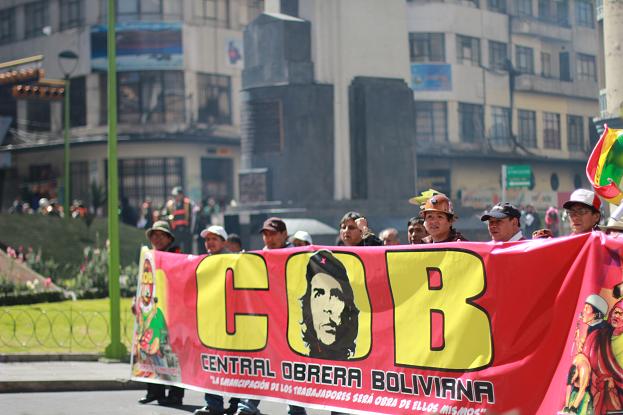Bolivia: Morales announces May Day nationalisation amidst workers protests Special Report
New in Ceasefire, Special Reports - Posted on Monday, May 7, 2012 0:00 - 0 Comments
By Ali Sargent
May Day workers protests in Lapaz, Bolivia (Photo: Ali Sargent)
Since Evo Morales’s ascent to power, an important Workers´ Day announcement has been customary. Past announcements have fulfilled significant campaign promises, such as the part-nationalisation of the hydrocarbons industry in 2006. In this year´s address the president sought to face a recent surge in strikes, marches and social unrest from workers´ unions.
An extra day of national holiday was declared for April 30th, doing little, however, to soothe workers. The news of a salary increase of 8% for members of the health and education sector, armed forces and the national police was widely rejected as insufficient. The minimum wage rate will also go up by 22%. The inflation rate is currently around 6%.
Fronting both last week and this week´s workers´ marches – the former of which was condemned for its levels of violence – the Central Obrero Boliviana (Bolivian Workers´ Association, COB) announced its intentions to “radicalise” pressure on the government.
In late 2011, the COB publicly advised the government to begin negotiations, rather then wait for conflict to erupt. Dynamite – a routine feature of many Bolivian marches – shook the main streets as the government´s ineffectiveness with respect to workers finance appeared a widespread sentiment.
It is not easy to ensure stable economic improvements that will reach all in Bolivia´s burgeoning economy; a significant proportion of which is informal and involves people working in jobs such as shoeshining, market selling, domestic work or in mining cooperatives (a form of less regulated mining business).
Figures released by Centro de Estudios para el Desarrollo Laboral y Argrario (Study Centre for Labour and Agragarian Development) state that, of the 1,050,000 people in employment across the country, only 17% are in formal employment. For those in informal or temporary work, accessing benefits such as the 8% salary rise will be very difficult.
Not all of the population is supportive of some of the workers´ demands. For the past six weeks, health workers have marched numerous times and declared an indefinite strike in opposition to the raising of compulsory working hours from six to eight. This provoked hunger strikes from sex workers in El Alto demanding a swift resolution be found so that their important routine healthcare checks are not be disrupted.
[jj-ngg-jquery-slider gallery=”23″ html_id=”Bolivia-May-Day” width=”623″ height=”414″ center=”1″ effect=”fade” pausetime=”6000″]
Waiting on suspended operations and appointments, patients at La Paz´s Hospital Obrero (Workers´ Hospital) took to the streets; they too demanding resolutions. A gas grenade was thrown into the Universidad Mayor de San Andres´ Faculty of Medicine, where health workers are conducting a hunger strike.
In a positive return to his promises to Bolivian workers, Morales followed his trend of Mayday nationalisations. Bolivia will nationalise the Transportadora de Electricidad SA, a subsidary of Red Eléctrica Espanola (REE, Spanish Electricity Network).
The Transportadora de Electricidad SA has 1.961km and 22 substations, Bolivia’s main electricity grid. It is also the second Spanish energy company to be nationalised by a Latin American country in recent weeks, following Argentina´s nationalisation of Repsol.
Morales´ address also included a change in paternity leave policy, giving three days to new fathers, as well as a plan to offer financial compensation to Bolivian victims of political violence.
[Photo credits: Ali Sargent]




Leave a Reply